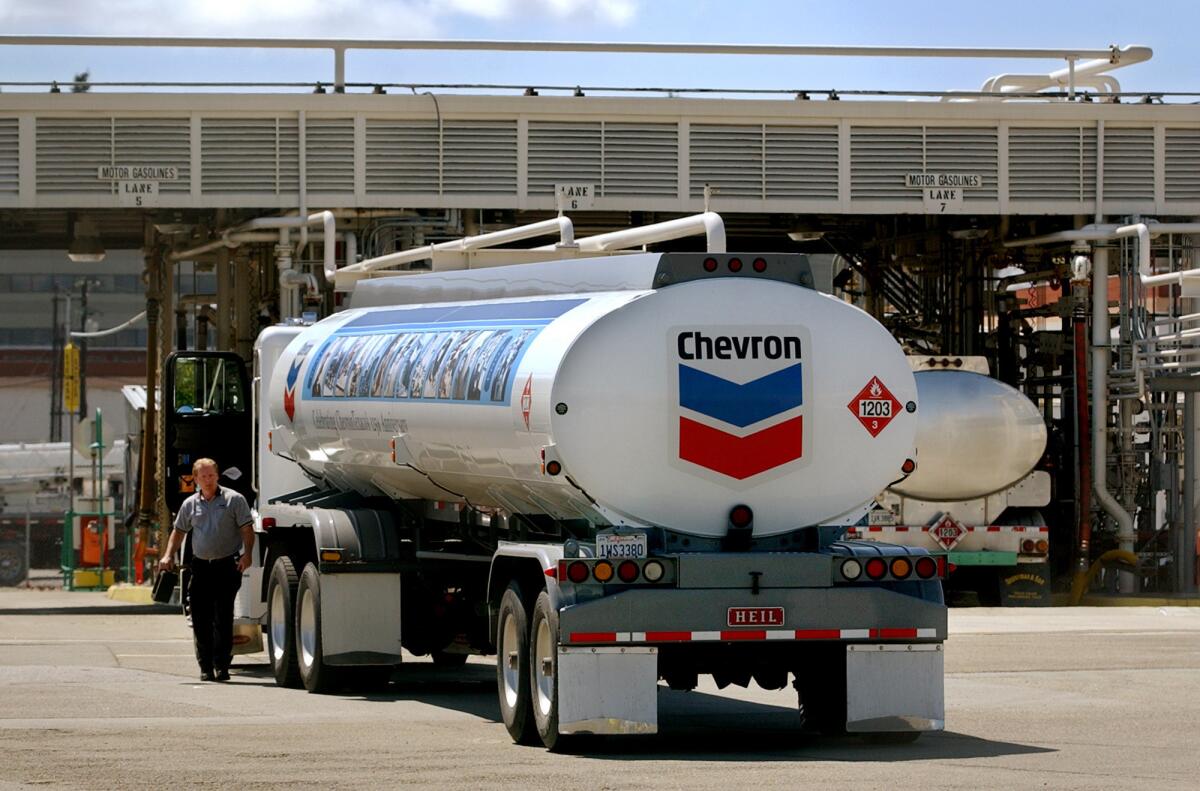Column: Oil industry subpoenas aim to harass and intimidate, consumer group says

- Share via
Litigation is nobody’s idea of fun (except, perhaps, lawyers), and that’s certainly true for anyone dragged into a lawsuit without being either a plaintiff or defendant.
That’s the situation facing Consumer Watchdog, the Santa Monica-based consumer group, which has spent thousands of dollars and hundreds of billable hours fending off a shower of subpoenas issued by big oil companies in connection with lawsuits to which the group isn’t a party.
Chevron and Exxon have served seven nonparty subpoenas on Consumer Watchdog since 2009, the group says. Over the last year or two, those companies and others in the oil industry have gotten “more and more aggressive,” says Jerry Flanagan, Consumer Watchdog’s chief counsel.
Aggressive legal bullying is not a new strategy for these companies.
— Peter Frumhoff, Union of Concerned Scientists
In July, Chevron, Exxon Mobil and Phillips 66 demanded the materials and names of sources the group used to produce a series of critical reports about the industry published on its website or presented to state agencies. The material included “all COMMUNICATIONS with ANY governmental agency,” including the state energy commission and attorney general’s office, related to the industry. (Emphasis in the original.)
The subpoenas are connected to a lawsuit brought by consumers and a gas station owner asserting that Chevron, Exxon Mobil and six other companies conspired to manipulate gas prices higher, an allegation made by numerous Consumer Watchdog articles.
Most recently, the oil companies filed a subpoena on Jan. 8 seeking a deposition from the group’s president, Jamie Court, on Jan. 28, without specifying what they want to ask him or why his personal appearance is so crucial.
Consumer Watchdog has told lawyers for Chevron and Exxon Mobil that Court won’t be available on that date; the companies say they’ll be flexible on scheduling but still want Court to appear.
On Feb. 18, 2015, an explosion ripped through Exxon Mobil’s vast refinery in Torrance, forcing a shutdown that took 10% of the state’s overall gasoline production capacity offline.
Flanagan estimates that he and his legal staff have spent some 500 hours responding to oil company subpoenas since 2018, at an estimated cost of $150,000, or fully 10% of the consumer group’s legal budget. “This is clearly designed to cripple us,” he says.
The oil companies say it’s nothing of the kind.
Exxon Mobil told me by email, “We reject any allegation that the subpoena process has been improperly used in this or any litigation.” Chevron’s lawyer, Steven E. Sletten, told me by email that the companies are seeking Court’s testimony “in the same way they would seek testimony from any witness identified as having factual knowledge” of the plaintiffs’ claims.
Sletten observes that it was the plaintiffs, not the oil companies, who first “injected” Consumer Watchdog into the case, by citing the reports written by Court or published by Consumer Watchdog in their lawsuits.
But that gave the oil companies a convenient opportunity to dump subpoenas on the consumer group.
Sletten didn’t assert that Court or Consumer Watchdog had anything to do with drafting or filing the lawsuits. Indeed, Flanagan says the plaintiffs merely “cut and pasted” the group’s reports into their legal complaints without even informing the group in advance that it was doing so. The reports, he says, are all public documents.
The oil companies’ actions reflect a harsh reality of civil litigation in federal court: Almost anyone can be dragooned into a lawsuit and forced to expend money and time to extricate themselves from the burden of a subpoena.
“It is kind of odd that somebody can be minding their own business and all of a sudden get a subpoena, and the default is to expect compliance,” says UCLA law professor David Marcus, a specialist in federal courts and civil procedure who has no involvement in the oil company case. But them’s the rules.
The oil industry has been depicting itself lately as the target of a conspiracy by scientists, local government officials and climate change activists to make it look bad.
Judges tend to be relatively more solicitous about the burdens on nonparties than on plaintiffs and defendants, Marcus says, but that doesn’t mean the targets can count on getting away scot-free. Judges have wide latitude in weighing claims that a subpoena seeks irrelevant material or infringes on a target’s 1st Amendment rights.
The lawsuits underlying the subpoenas were filed against Chevron, Exxon Mobil and six other oil and gas companies in 2015 and 2018 and consolidated in federal court in San Diego. The oil companies reject the allegations.
So what’s going on here? The companies’ overt goal is to discredit the group’s articles about the oil industry. But Consumer Watchdog says there’s more to it. The group says the subpoenas are part of a “strategy to harass, intimidate, and inconvenience the organization as punishment for its investigative reporting into the oil and gasoline industry over the last 25 years.”
This isn’t the first time that the oil companies have been accused of wielding nonparty subpoenas as weapons against consumer and environmental activists.
In 2016, Exxon Mobil sought to defang a pending investigation of its role in climate change by Attys. Gen. Maura Healey of Massachusetts and Eric Schneiderman of New York by issuing subpoenas and subpoena threats to a passel of environmental groups. The subpoenas were ostensibly connected to a lawsuit Exxon Mobil had filed against Healey and Schneiderman in federal court in Texas to block their investigation.
The subpoena targets included the Union of Concerned Scientists and the Rockefeller Family Fund, which had been financially supporting environmental advocates with money ultimately derived, ironically, from Standard Oil, founded by family patriarch John D. Rockefeller. The subpoenas to some targets sought, among other things, records of contacts the groups had with Healey, Schneiderman and former Vice President Al Gore, a prominent activist on climate change.
Big corporations are known for being two-faced — presenting a nurturing, maternal face to the outside world while ruthlessly pursuing profit on the inside.
“Aggressive legal bullying is not a new strategy for these companies,” says Peter Frumhoff, chief climate scientist at the Union of Concerned Scientists, who was served individually with a separate subpoena at the time.
“Part of their goal is to take up a lot of people’s time, send a shot across the bow of others,” Frumhoff says. “No matter what the actual outcome is, it’s a reasonable interpretation that it’s intended to intimidate not only the nonparty that’s being focused on, but to send a broader signal that those who seek to hold companies accountable will pay a price.”
Around the same time that the oil companies issued their subpoenas, numerous environmental groups were served with subpoenas by the House Committee on Science, Space and Technology, which was then chaired by Rep. Lamar Smith (R-Texas), a notable climate change denier with close ties to the oil and gas industry.
UCS never turned over any documents to Exxon, Frumhoff told me. The Texas lawsuit was ultimately thrown out of court and the subpoenas rendered moot. Smith never enforced his subpoenas, and his anti-science campaign ended in 2018 with his retirement and the advent of a Democratic majority in the House.
Healey continued her investigation (Schneiderman left office in 2018 amid allegations that he physically abused women), which has culminated in a lawsuit she filed against Exxon Mobil in October, alleging that it misled Massachusetts consumers and investors about “the risks to Exxon’s business posed by fossil fuel-driven climate change.”
Nonparties such as the consumer and environmental groups served with oil industry subpoenas have limited options. Simply ignoring the subpoenas could leave them open to being cited for defying a court order. They can file a motion to quash in court, typically asserting that the information sought is irrelevant to the underlying case or can be obtained from other sources, or that the subpoena imposes an undue burden or expense.
The oil and gas industry has never been shy about deploying its billions of dollars in resources to get what it wants from the political system.
At that stage, however, “the person moving to quash a subpoena bears the burden of proof,” says Simona Grossi, an expert in federal and state civil procedure at Loyola Marymount University Law School. “Mere assertions of undue burden or disclosure of confidential information will be insufficient to support a motion to quash.”
Its adversary also can file a motion to compel compliance, raising the possibility of a lengthy and expensive fight before a judge.
More commonly, nonparties try to answer a subpoena by complying with the more routine and least burdensome demands and raising objections about the rest directly with the opposing lawyers, in the hope of persuading them to narrow the subpoena or drop it entirely.
That’s the approach Consumer Watchdog has taken thus far. The organization was founded in 1985 as the Foundation for Taxpayer and Consumer Rights by consumer activist Harvey Rosenfield, who drafted Proposition 103, an insurance reform measure passed by California voters in 1988.
Its most important current campaign aims to reform the state’s overly restrictive limit on damage awards in malpractice cases, which it’s hoping to place on the November state ballot, but allegations of price fixing by the oil industry have been on its agenda for years.
Consumer Watchdog responded in September to the oil companies’ July 2019 subpoena by submitting 43 pages of press releases, blog posts, news articles and videos, most of which already had appeared on its website. But it rejected demands for what it called confidential or proprietary information or any “privileged information, including, without limitation, information protected by the attorney-client privilege, attorney work product privilege, and the 1st Amendment.”
“We have nothing to hide, other than our sources,” Flanagan told me.
Sletten dismissed those objections in a letter to Flanagan on Sept. 24. Sletten asserted that in part because Consumer Watchdog’s “misguided advocacy was a catalyst for plaintiffs’ unfounded and unsupported conspiracy claims,” it’s “far from independent” and not entitled to free speech protections traditionally enjoyed by journalists.
“What Chevron and Exxon have failed to explain is why they need Consumer Watchdog’s confidential sources and compelled testimony to prove their case that they did nothing wrong,” Flanagan says. “They can do that without harassing Consumer Watchdog by bringing in their own experts to prove their case.”
Whether the oil companies will follow through on their subpoenas by asking a judge to compel Consumer Watchdog’s compliance isn’t clear. There are risks to both sides in jumping the matter up to that level.
The 1st Amendment argument, in the judgment of UCLA’s Marcus, is a “strong argument” for the consumer group. “They say, ‘We’re an advocacy organization and our work requires us to have people talk to us and give us information, and if they knew the oil companies could get it simply by issuing a subpoena, we wouldn’t be able to do our work.’ That’s probably enough to shift the burden to the oil companies to show why their request wouldn’t infringe on [the subpoena targets’] rights.”
Moreover, judges generally are unhappy with subpoenas that “seem to have an air of harassment about them,” Marcus says. “There might be some risk for oil companies in really pursuing this.”
On the other hand, litigation often unfolds as a war of attrition, and the oil industry has a lot more money to spend than Consumer Watchdog, which has an annual budget of about $3 million and lots on its plate.
“They could walk away, but they’re Chevron and Exxon,” Flanagan says. “They’re not going to walk away.”
More to Read
Inside the business of entertainment
The Wide Shot brings you news, analysis and insights on everything from streaming wars to production — and what it all means for the future.
You may occasionally receive promotional content from the Los Angeles Times.














